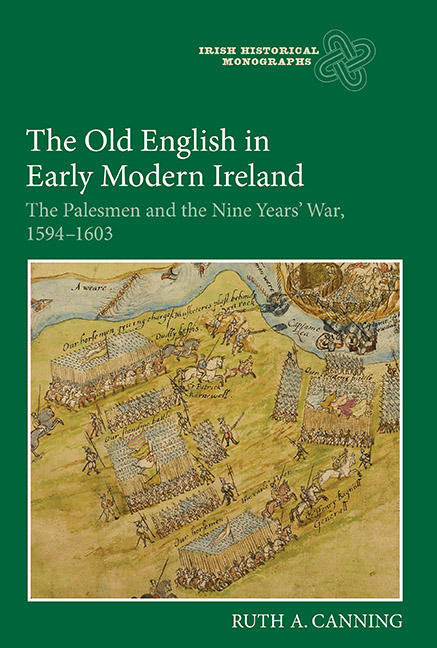Book contents
- Frontmatter
- Dedication
- Contents
- Acknowledgements
- Note on Conventions
- Abbreviations
- 1 Pale Politics: An Old English Community and the Outbreak of War
- 2 Instruments of Sedition: Priests and the Pale
- 3 Secret Traitors and Crown Colluders: The Palesmen's Response to Patriotic Pressures
- 4 ‘Patriot Games’: Old English Participation in the Crown's Military Enterprise
- 5 ‘Road to Perdition’: The Socio-Economic Impact of War on the Pale
- 6 Office and Influence: Defending a Tradition of Privilege
- Epilogue: An Inconclusive Aftermath
- Bibliography
- Index
- Irish Historical Monographs Previous Volumes
2 - Instruments of Sedition: Priests and the Pale
Published online by Cambridge University Press: 07 September 2019
- Frontmatter
- Dedication
- Contents
- Acknowledgements
- Note on Conventions
- Abbreviations
- 1 Pale Politics: An Old English Community and the Outbreak of War
- 2 Instruments of Sedition: Priests and the Pale
- 3 Secret Traitors and Crown Colluders: The Palesmen's Response to Patriotic Pressures
- 4 ‘Patriot Games’: Old English Participation in the Crown's Military Enterprise
- 5 ‘Road to Perdition’: The Socio-Economic Impact of War on the Pale
- 6 Office and Influence: Defending a Tradition of Privilege
- Epilogue: An Inconclusive Aftermath
- Bibliography
- Index
- Irish Historical Monographs Previous Volumes
Summary
It is Popery that hath alienated the heartes of that people from the faith, fidelity, obedience, loue and loyaltie, that is required in Subiects towardes theyr Souereignes. It is Popery that hath set afoot so many rebellions in Ireland, that hath cost the liues of multitudes, that hath ruined that whole Realme, and made it subiect to the oppression of Theeus, Robbers, Spoilers, Murtherers, Rebels and Traitors.
Barnaby Riche, 1610By the 1590s, both Hugh O'Neill and English crown administrators had every right to think that a war fought in the name of the Catholic Church would rouse the Old English population of the Pale from passive recusancy to armed revolt. A ‘faith and fatherland’ ideology had struck roots in Ireland long before the outbreak of the Nine Years’ War. It had found early expression in the revolts of James Fitzmaurice (1579), Viscount Baltinglass (1580), and William Nugent (1581). Not only had the Old English leaders of these uprisings espoused a Catholic cause, but their actions and assertions had been bolstered by the ministries of Counter-Reformation clerics who openly denounced English heresy and solicited foreign intervention for Ireland. These clerics were some of the earliest proponents of an Irish ‘faith and fatherland’ philosophy and they would come to be regarded as the chief propagandists of the nationwide revolt led by Hugh O'Neill. How this came to be and how the work of the clergy became coterminous with the ideological wing of O'Neill's rebellion is crucial to understanding the Nine Years’ War and the predicament of Ireland's Catholic inhabitants. The involvement of Catholic clerics gave many administrators cause to fear the kind of religious fervour they might inspire, and this anxiety was clearly articulated in official records. This chapter will therefore examine the activities of some of O'Neill's chief clerical conspirators to illustrate that O'Neill's hopes and administrators’ concerns were not groundless. However, it will also challenge the assumption that an appeal for a Catholic crusade would find wide and enthusiastic support in Ireland, and especially amongst the population of the Pale. Although religious concerns are clearly apparent in the State Papers, evidence suggesting that religion and the Catholic clergy played a decisive role in this conflict is inconclusive.
- Type
- Chapter
- Information
- The Old English in Early Modern IrelandThe Palesmen and the Nine Years’ War, 1594–1603, pp. 14 - 49Publisher: Boydell & BrewerPrint publication year: 2019



